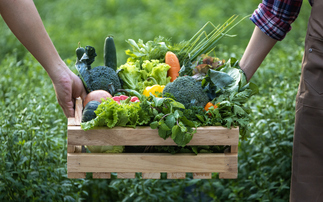Despite its luxury cachet, many of Afghanistan's cashmere farmers still live in extreme poverty - Fashion giant Burberry has teamed up Oxfam and PUR Projet to try and change things for the better
The luxury labels that populate the wealthiest shopping districts in London, Paris, Milan and New York may seem far removed from the fight against extreme poverty. After all, what could jumpers and bags that cost thousands of pounds apiece have to do with the millions of people living on less than $1.25 a day?
The answer is, more than you might think. After all, luxury labels have to source their raw materials from somewhere, and in some cases the farmers, miners, and producers at the bottom of this supply chain are barely scratching a living.
Take Afghanistan, for example. Poverty in the country is on the increase. Years of conflict have left more than half the population living below the poverty line, defined by the World Bank in 2016-7 as $1 for Afghanistan. Meanwhile, more than four out of five Afghan adults aged 25 and above have not completed any level of education.
Yet Afghanistan has the potential to become a leading supplier of one of the most lucrative luxury materials. Some 95 per cent of Afghan goats produce cashmere, the superfine hair favoured by high-end fashion houses for its soft, stylish wool.
But thousands of Afghan goat farmers still live in extreme poverty despite the high value of their goats' hair. Experts suggest just 30 per cent of goats in Afghanistan are currently harvested for cashmere, with a lack of education, knowledge, and cashmere processing infrastructure stymieing the potential growth of an industry that could lift thousands of people out of extreme poverty.
Burberry is one of the world's major buyers of cashmere, and earlier this year its Foundation launched a new five-year project with Oxfam and green consultancy PUR Projet to train and empower goat farmers in Afghanistan to build a more sustainable cashmere industry in the country.
The project forms part of Burberry's commitment to "positively impact" one million people in the communities sustaining the luxury fashion industry, which is at the heart of its 2022 Responsibility agenda. It is an overarching strategy that Pamela Batty, VP of corporate responsibility for Burberry and secretary to the Burberry Foundation, explains was developed with the Sustainable Development Goals (SDGs) in mind.
She tells BusinessGreen the Afghan project will work with local herders to create community-owned collective action organisations, as well as provide them with the "necessary knowledge, technical skills, essential services and access to markets to support sustainable farming and economic development".
Currently goat herders in Afghanistan have limited training and resources for animal care, nutrition and protection, which results in a higher mortality rate in their herds and lower yields for cashmere, as well as dairy, kids, and meat from the goats. There is also poor understanding of rearing and harvesting techniques, and how to develop sustainable business plans for future investment.
The scheme aims to tackle these issues with a three-pronged approach, Batty explains. "The first step is to strengthen the environment for goat producers to enable them to harvest, process and sell cashmere," she says. "Secondly, the programme aims to improve the livestock management of goat producers for breeding, feeding and animal health. And finally, the programme will help to organise goat producers in collective action organisations at the community-level to develop market linkages and collective sales."
Giving farmers a better understanding of sustainable farming techniques is also expected to bring climate benefits, by preventing overgrazing which can lead to desertification. And it should equip herders to better cope with extreme weather from climate change, such as prolonged drought or flash flooding, Batty explains.
"We hope that the programme will create a more inclusive and sustainable cashmere industry in Afghanistan, helping herders enhance their livelihoods, advance sustainable farming practices and economic development in the region," she concludes.
And there is an obvious business upside for Burberry, as it helps secure more sustainable supplies of a strategically important raw material. Every year Afghanistan exports roughly 1,000 tonnes of cashmere every year, around seven per cent of current global supply - just a fraction of its market potential. Cashmere buyers such as Burberry are crying out for new supplies to diversify, and de-risk, their supply chains, but the expansion of the Afghan cashmere industry is not just a glimmer of hope for them. It's also a potential lifeline for those struggling to make a decent living in the country's rural, mountainous regions. When it comes to tackling extreme poverty, those £1,000 jumpers could play a major role indeed.









